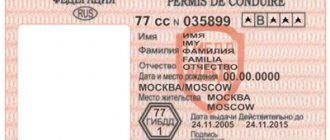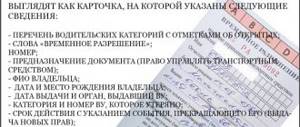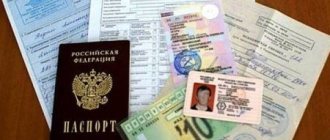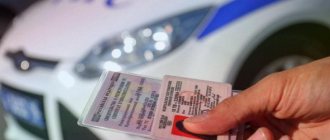Validity
The legal validity of a driver's license is 10 years. After this period has expired, the document can be received again. To do this, you do not need to re-train at a driving school or take exams. The only condition is passing a medical examination.
The fact is that over 10 years the driver’s health condition may become worse, and driving such a driver can be dangerous not only for himself, but also for other road users. (the most likely causes are deterioration of vision, hearing, general physical condition, etc.)
The established period of validity of rights of 10 years applies only to Russian citizens. If a Russian-style certificate is issued to a foreigner temporarily residing in the country (for example, a citizen of the Republic of Belarus or the Republic of Kazakhstan who came for seasonal work in Russia), then his rights are valid only for the duration of his stay in Russia.
ATTENTION !!! After the expiration of the period, the holder of the invalid certificate must apply for a new document. An application for replacement of rights can also be submitted by last name using the State Services portal. There is also the opportunity to pay the state fee for replacing rights, and in 2021, when replacing rights through the State Services website, this can be done with a 30% discount. Also, starting from February 2021, this procedure is carried out throughout the country, regardless of geographical dependence on the place of registration of the car owner.
It is also possible that controversial situations may arise regarding the validity of rights on the last day. Although in reality disputes are resolved very simply. Rights are considered valid exactly until the end of the day specified in the rights as the last. That is, until 23:59 of the last day, the driver has the right to drive with a license on a completely legal basis.
Replacement of rights is also carried out when changing the surname, and in the event of a serious illness, which, due to physical limitations in health, does not make it possible to drive any of the categories of transport specified in the rights.
Can they refuse due to fines?
Not all drivers pay off fines, so if they need to renew their license, they are interested in whether the debt will prevent them from going through the procedure. According to the law, they cannot refuse the process, but it is recommended to pay amounts for violations before submitting an application to the traffic police. Employees may not want to change their license if it turns out that the driver is in debt.
If fines are not paid on time, sanctions will be taken. You will have to pay money for the delay, and the amount is equal to the debt in double amount. Administrative arrest may also be applied. Therefore, before going to the traffic police, pay all fines. Then you will be sure that the procedure will be carried out without problems.
Possible reasons for refusal:
- not all documents from the main list have been provided;
- the official papers turned out to be false;
- the certificates are no longer valid.
You should check each paper before submitting it with your application. Otherwise, you will then have to urgently obtain valid certificates or certificates. You can apply for a replacement even before the certificate expires - for example, six months before its expiration date.
Amount of fine
According to the law, driving a car after the expiration of this license is tantamount to not having one at all. Such an offense is punishable by a fine of up to fifteen thousand rubles. The inspector who issues the fine or the judicial authorities have the authority to more accurately determine what punishment the violator faces.
IMPORTANT !!! If the owner of the vehicle transferred the right to drive to another citizen who had an expired license, then the amount of the fine for the owner of the car doubles.
As soon as the traffic police inspector stops the car and discovers that the documents are overdue, the trip is immediately interrupted and the driver is removed from control. At the same time, the inspector has the right to decide whether to send the vehicle to the impound lot. In accordance with the requirements of Article 27.3 of the Administrative Code, the driver in this case assumes the costs of providing such a service, paying for the arrival and work of the tow truck, as well as for every day the car is in the impound lot.
In this case, the car will not be returned to its owner until he receives a new license or pays the fine in full. Another person can also pick up the car on the basis of a notarized power of attorney. In addition to the power of attorney, such a person must have a valid license for a car of this category.
IMPORTANT !!! In addition, the traffic police inspector, having stopped the driver and established the fact of such a violation, is obliged to take away his expired license from the driver. When replacing the document in the future, it is necessary to indicate that the rights have been confiscated.
Some drivers, having expired documents, may try to mitigate their punishment. When the inspector demands your license, they may say that your license was forgotten at home.
In the case when such an offender has the remaining necessary documents for the car (except for the driver’s license, which was allegedly “carelessly left at home”), the attempt to deceive the inspector may be successful. In this case, the driver will receive the minimum possible punishment (according to Article 12.3 of the Administrative Code - a fine of 500 rubles or even a warning)
ATTENTION !!! However, if the inspector nevertheless decides to check the information and makes a request about the availability of rights in the database, or offers to go with the driver to his home, where the license has been forgotten, then the driver will have to pay the fine provided by law. Moreover, for attempting to deceive the inspector, most likely, the amount of punishment will be the maximum possible for this article - fifteen thousand rubles.
In the event of an accident in which the driver of the car, driving it with expired documents, became an injured person, he automatically completely loses the right to receive insurance payments under the MTPL insurance policy. Even not guilty of violating traffic rules during an accident will not serve as a sufficient basis for the insurance company to pay out the insurance. However, even in court it will not be possible to obtain the right to insurance payments.
The procedure for restoring a driver's license in the presence of traffic police fines
You can submit an application and receive a new driver's license from the traffic police without delay. Traffic violations and timely payment of fines will relieve the driver of some problems when obtaining a driving license or updating a document.
The procedure for restoring the VU:
- Payment of all fines for traffic violations (receipts are saved and submitted together with the application);
- Collection of necessary documents: identity card, vehicle title, exam book;
- Submitting an application for reinstatement of the driver's license;
- Payment of state duty (1,600 rubles).
It takes from 1 to 30 working days to review the application.
Grounds for refusal to replace the holder:
- lack of certificates and documents according to the list approved by the Government Decree;
- presentation of false papers;
- invalid certificates (violation of deadlines).
A preliminary contact with the traffic police will allow you to check/change the package of collected documents to obtain a new driver’s license.
To obtain permission to drive a vehicle, drivers must undergo a background check procedure and protect themselves from receiving a new fine from a traffic police inspector.
For timely payment of penalties when changing the driver's license, the fine is reduced.
Payment Methods
For the convenience of citizens, the majority of all fines imposed by the traffic police can be paid directly on the official website of this government agency.
In the appropriate section of the site, you need to find your decision (this can be done either by the car number or by the driver’s license number), and then pay for it in one of the convenient ways:
- Bank payment card.
- Through the use of electronic payment systems.
- By printing the receipt and visiting any bank or post office.
It is worth considering that payment at a bank branch or with a bank card on the traffic police website additionally entails payment of a commission fee in favor of the banking institution. This payment can also be made through the Qiwi self-service terminal by entering the number of the receipt issued by the inspector when paying. In this case, you must keep the payment receipt.
In addition to the traffic police website, the fine can be paid online through the State Services portal. The portal additionally provides the service of sending information about the payment made to the authority that imposed the fine. Also, when paying a fine through the State Services portal, within 20 days after its imposition, the driver has the right to count on a discount of up to half of its amount.
Criminal liability
Fine for driving without a license
There will be no serious criminal penalties for non-payment of sanctions. Maximum – arrest for 15 days, replaceable with forced labor.
Important! If you fail to pay the fine, you must immediately admit guilt. It is necessary to convince the judge that this will not happen again and that the mistake is fully understood. Perhaps this will help avoid a two-week prison sentence.
If there are no debts, you need to stand your ground and prove your innocence. To appeal fines, you can write a complaint to the head of the traffic police at your place of residence or go to court, having prepared in advance all the evidence of innocence. In addition, without a protocol on an administrative violation, a person does not have the right to be brought to justice.
You can get a license if there are traffic fines, but in the process you can run into a lot of troubles. Therefore, you should not look for reasons to avoid punishment and “delay” payment; now there is a lot of evidence against the violator: video recordings from surveillance cameras, entries in the database, etc. Therefore, you need to dispute guilt with 100% confidence in the rightness.
Is there a chance to challenge the issued fine?
In most cases there is no such possibility. In order to issue a fine for this offense, the fact of being behind the wheel and moving the car must be recorded. If there is such a record, it is hardly possible to challenge the fact of the offense.
A judicial appeal has a slightly greater chance, but in the best case, the offender may be able to reduce the fine, and then only if there were serious violations on the part of the traffic police inspector (for example, when drawing up a protocol).
When intentionally driving a car with an expired license, the driver must independently understand the public risk of such an offense. If such a violation is discovered, there is practically no basis for mitigating the punishment. After all, it is hardly possible to forget about having an expired driver’s license. And depending on how long the excess is, the punishment becomes proportionate to the violation. Since expired rights are equated by law to their complete absence, there is practically no chance of receiving leniency from the court.
If the driver decides to challenge the fine, counting on a review of the court's decision, then this can be done within 10 days after the court ruling is issued.
In addition to obvious violations of the inspector (which it is advisable to prove documented or using video and audio), other possible arguments for trying to reconsider the decision may be:
- Insignificant period of delay of the document.
- Evidence of the presence of a disease that prevented timely contacting the traffic police for a replacement (for example, serious diseases of the musculoskeletal system associated with temporary restrictions on movement, being inpatient treatment in a hospital, etc.).
- Evidence showing that when stopped by a traffic police inspector, the driver was sent to get a replacement document. Although, in reality, it is extremely difficult to prove such a fact.
IMPORTANT !!! However, the outcome of court proceedings in almost all such cases remains not in favor of the driver with an expired license.
And transferring the case to a primary or re-trial hearing automatically deprives you of the opportunity to receive a 50% discount when paying a fine. Taking into account the payment of legal costs, which also falls on the violator, it turns out that when challenging, he loses even more money than he could save if he pays the fine right away.
In any case, the best option is to promptly contact the traffic police for a replacement driver’s license. The amount of the fee is much less than the fine, and registration using the Internet has significantly reduced the time spent on obtaining a new document.
Do fines carry over to new licenses?
When replacing a driver's license, they check for fines and do not exempt the driver from paying for traffic violations. All debts remain with the citizen and he is obliged to pay them. Personal identification is confirmed by the vehicle title and assigned license plate. You can challenge an offense in court:
- prove the theft of a vehicle (statement to the traffic police);
- provide evidence of non-involvement in the incident.
A conscientious attitude and honesty will help you avoid penalties under the new article. And for fraud and attempts to evade payments, fines to the state budget may be increased.
Is it possible to sell a car with fines - how to properly check and re-register the vehicle?
To complete a car purchase and sale transaction, the vehicle owner is not required to provide a receipt for payment of existing debts or confirmation of their absence. But is it possible to re-register a car with traffic fines?
It is worth understanding that fines are issued not to the car, but to its owner. And if the date of the violation refers to the day before the sale, the sanctions will not be transferred to the new owner: it will not be possible to rewrite the traffic police fine to another person. However, the buyer has only 10 days to start re-registering the car and registering it.
And although the transfer of a car with encumbrances is not allowed, such transactions are still carried out. But such transactions can be appealed, and fines cannot be transferred to another owner. The very understanding that a person bought a car with fines is relative.
Is it possible to deregister a car if there are unpaid fines?
Traffic police officers are not authorized to require the owner to pay fines before deregistering a vehicle. If employees, for any reason, threaten to refuse to carry out registration actions, then they are breaking the law.
Order of the Ministry of Internal Affairs No. 1001 “On the procedure for registering vehicles” does not contain provisions that it is necessary to check the vehicle for the absence/presence of fines during registration actions.
Accordingly, failure to pay debts cannot become an obstacle for a person to be deregistered.
And if a traffic police officer states otherwise, the driver has the right to demand a written refusal indicating the reasons.
The act will make it possible to contact control and supervisory authorities, in particular the prosecutor’s office, where the legality of such a refusal will be verified. If violations are detected, the official may be held accountable.
Prohibition of registration actions due to unpaid fines
In order to deliver a car or deregister or sell a vehicle, a person needs a preliminary inspection after submitting the appropriate application and submitting documents. But there are no mandatory conditions for payment of debts. If there are debts, the car can be re-registered to another person, it is allowed to be sold, anyone has the right to buy it.
There is no prohibition in modern administrative legislation on registration actions with a vehicle. There is an official document, on the contrary, that excludes the possibility of establishing a ban on registration or deregistration only due to unpaid fines - DOBBD of the Ministry of Internal Affairs No. 13/5-77 “On the inadmissibility of demanding payment of fines” was issued in 2009.
The decree notes that the Traffic Safety Department reviews numerous complaints from individuals and legal entities every day. They are connected with the fact that traffic police officers in the process of performing registration actions require various certificates and confirmation of absence:
- administrative fines;
- transport tax debts;
- problems with a driver's license;
- debts for utility and other municipal payments.
Due to the frequency of requests, the Department sent an instruction according to which inspectors in the constituent entities of the Russian Federation are obliged to exclude these violations from their activities: unreasonable demand for documents and information not provided for by law. After the document was adopted, internal inspections were carried out, and employees found guilty of such actions were subject to disciplinary action.
Documents required for selling a car
A legally competent purchase and sale transaction of any vehicle requires the submission of a number of documents, information about which is largely reflected in the text of the contract. Transfer of the car, including if it is intended to sell the car with fines, is impossible without a number of identification documents.
The seller must have with him:
- original passport;
- registration certificate;
- vehicle passport;
- Insurance policy and diagnostic card, if the owner has one.
On the buyer’s part, it is enough to present a passport for identification and enter personal data into the sales contract in the “Parties” section and the preamble.
The procedure for selling a car with fines
The updated legislation allows selling cars second-hand in a simplified manner and the transaction has acquired a new simplified form:
- possible without contacting a notary to certify the document;
- state numbers are retained without being deregistered;
- carried out not only at the place of registration, but also at any other traffic police department;
- occurs without transit numbers.
When the buyer finds out the information he needs, the deal can be concluded. The new owner has a short period of time - 10 days - to register the vehicle in his name. If this does not happen, the old owner will continue to receive notices in his name. It is better that the transaction is confirmed and registered with the state inspectorate.
Financial responsibility for previous violations of traffic rules lies with the person who committed it.
As a result, after the sale, the owner does not acquire obligations to the state, since they are not removed from the old owner.
A car check can be done in several ways:
- on the official website of the inspection;
- on the State Services portal;
- in Yandex services;
- on the FSSP website.
Although today such actions are not at all necessary, since fines are not assigned to the car. The new owner will not have to pay for them.
It is much preferable to check the fact of collateral, despite the fact that such services are often paid. The type code will also help clarify whether the car has been involved in traffic accidents. Another preliminary verification measure is the vehicle documentation: the same person must be indicated everywhere - the owner (or several) of the car.
Re-registration of a car in 2021 – is it necessary to deregister? ( 1 5.00 out of 5) Loading…
Source: https://AvtoZakony.com/oformlenie/mozhno-li-pereoformit-mashinu-so-shtrafami
Will your license be changed if there are unpaid fines - Advice from a car lawyer
It is prohibited to drive with an expired driver's license. And the driver himself will feel insecure, afraid of meeting a traffic police officer on the way, who may fine him.
The fear of such a ride increases if a person also has an unpaid fine. Some people wonder whether fines are checked when replacing licenses. If the driver respected the chain of command and paid for violations on time, then replacing the license is not a problem.
But if debt still exists, you need to know what to do in such cases.











